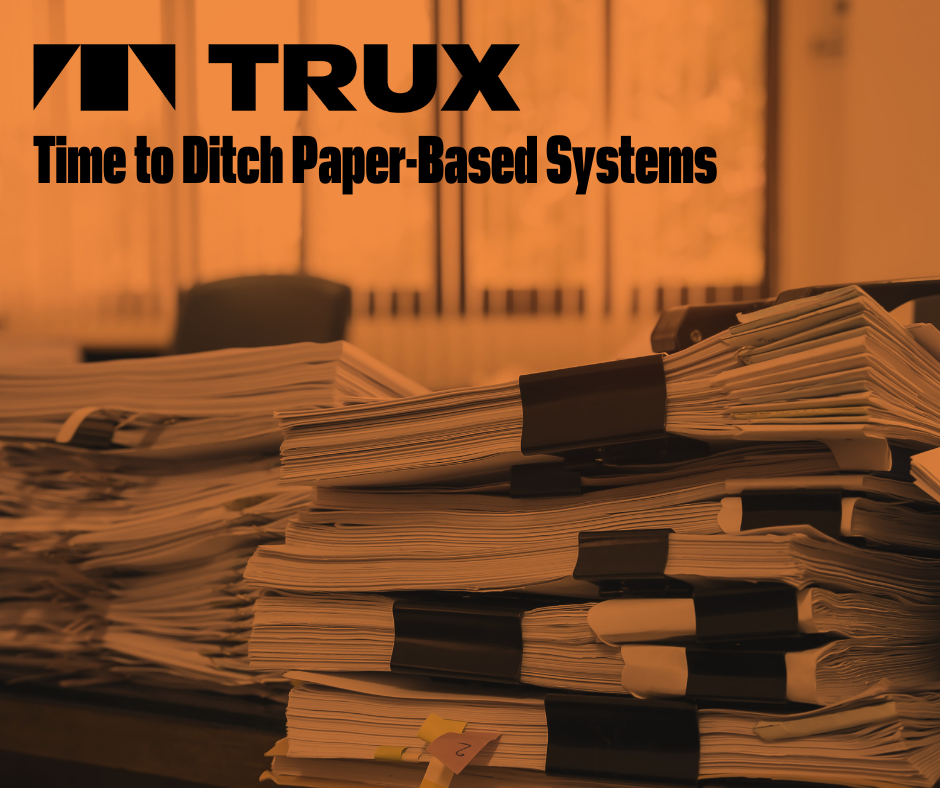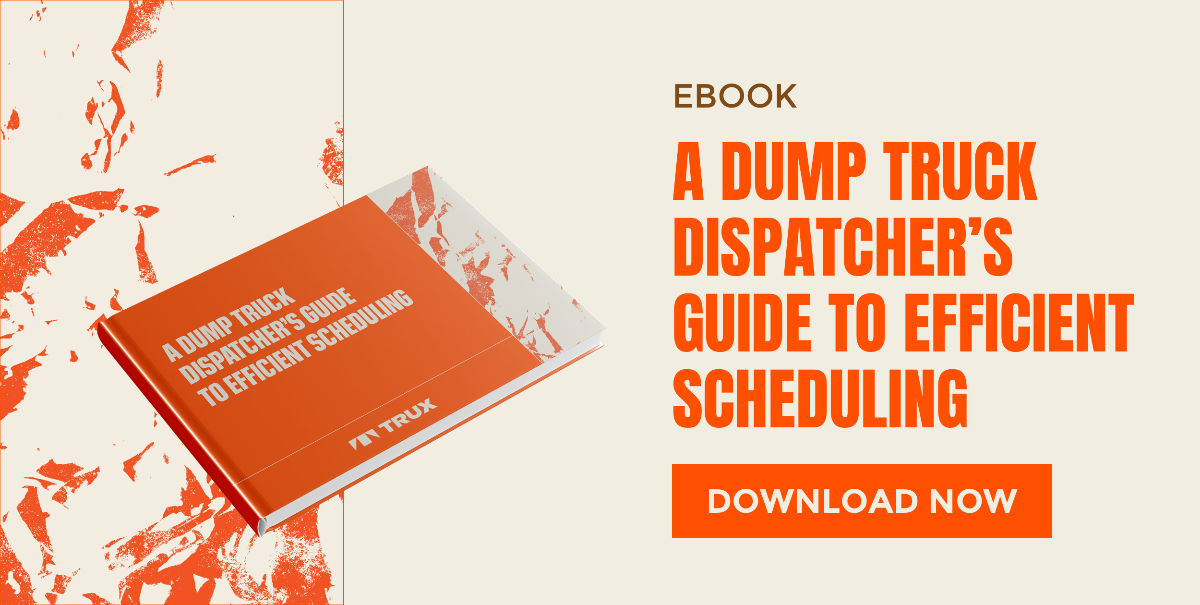7 min read
Why It’s Time to Ditch Paper-Based Systems for Hauling Management
By: TRUX Team on Feb 21, 2025 8:49:38 AM

In construction, efficiency is everything. Whether you’re managing your own fleet or hiring third-party haulers, wasted time and miscommunication can cut into your profits. Yet, many contractors and material producers still rely on outdated paper-based dispatching and hauler management systems.
If you’ve ever dealt with missing load slips, struggled to track trucks on the job, or waited too long to invoice, you know how frustrating and costly paperwork can be. It leads to billing disputes, slows down operations, and creates unnecessary headaches for dispatchers and haulers alike.
The good news? There’s a better way. Digital hauling management solutions like Trux help construction companies keep track of their trucks, simplify scheduling, and speed up invoicing—making it easier to stay organized, cut down on mistakes, and keep jobs moving.
It’s time to ditch the paperwork and take control of your hauling. Here’s why switching to a digital system is the smartest move for your business.
Click a topic below to jump to the relevant section:
The Downsides of Paper-Based Systems
The Benefits of Switching to a Digital Hauling Solution
Efficiency and Cost Savings: The Big Picture
The Downsides of Paper-Based Systems
Relying on paper for dispatching and hauler management might seem familiar, but it creates more problems than it solves. From missing load slips to slow invoicing, outdated systems cost time and money. Here’s why sticking with paper is holding your business back.
1. Lost or Delayed Load Slips
Paper load slips are easy to lose or damage, creating issues when it’s time to invoice customers or pay haulers. Chasing down missing tickets wastes time and can delay payments. With Trux, haulers upload photos of their load slips digitally after every completed load, so contractors no longer have to wait for physical copies. This means invoicing happens faster, haulers get paid sooner, and everyone stays on the same page.
2. Slow and Inefficient Dispatching
Coordinating haulers by phone or text takes up valuable time. Dispatchers have to check in constantly to confirm availability, adjust schedules, and track progress. Last-minute changes turn into a guessing game, creating delays and frustrating both drivers and site managers.
3. Delays in Invoicing and Payments
With paper-based processes, load slips need to be collected and entered before invoices can be sent. If haulers don’t turn them in quickly, payments get delayed. Since Trux allows haulers to upload load slips in real time, contractors can process invoices sooner, keeping cash flow steady and reducing unnecessary waiting time.
4. Lack of Transparency and Oversight
When everything is done on paper, there’s no easy way to track work in progress. Without clear records, it’s harder to confirm whether haulers completed the work as expected, which can lead to disputes over hours, loads, and rates. Guesswork and blind spots in tracking make it easier for costs to spiral out of control.
Paper might have worked in the past, but in today’s fast-moving industry, it’s causing more problems than it solves. Up next, we’ll look at how digital solutions help companies avoid these common headaches.
The Benefits of Switching to a Digital Hauling Solution
Paper-based systems create delays, errors, and unnecessary work. Moving to a digital hauling solution helps contractors, material producers, and haulers stay organized, work more efficiently, and get paid faster. Here’s how going digital makes a difference.
1. Faster and More Accurate Dispatching
With a digital platform like Trux, dispatchers can schedule and adjust hauls quickly without relying on endless phone calls and texts. Haulers receive updates right on their phones, reducing confusion and eliminating wasted trips. This keeps projects on track and ensures trucks are being used as efficiently as possible.
2. Real-Time Load Tracking & Visibility
Instead of relying on phone check-ins or handwritten notes, contractors can track every load as it moves from pickup to drop-off. With Trux, haulers log their loads digitally, giving contractors and material producers a clear record of where trucks are and what’s been delivered. This visibility helps prevent overpayments, disputes, and costly delays.
3. Digital Load Slips = Faster Invoicing & Payments
Instead of waiting for haulers to turn in paper tickets, Trux allows them to upload photos of their load slips as soon as a job is completed. This eliminates the need to chase down missing paperwork and allows contractors to invoice their customers faster. Haulers also benefit by getting paid sooner, improving cash flow for everyone involved.
4. Reduced Administrative Headaches
Paperwork slows down the back office. Sorting through stacks of load slips, manually entering data, and fixing errors take up valuable time. With digital records, everything is stored in one place, making it easier to track jobs, confirm deliveries, and reconcile payments—without the hassle of paperwork.
5. Increased Confidence in Costs & Payments
When hauls are managed digitally, there’s a clear record of what work was completed, when it was done, and how much is owed. This reduces the risk of overpaying for work that wasn’t completed and ensures contractors are only paying for what they should. With a reliable system in place, businesses can better control their costs and avoid unexpected budget issues.
Switching to a digital system doesn’t just make life easier—it helps businesses run more smoothly, reduce waste, and stay profitable.
Efficiency and Cost Savings: The Big Picture
Switching from paper-based systems to a digital hauling solution isn’t just about convenience—it’s about saving time and money. Every delay, lost ticket, and miscommunication adds up, cutting into profits and slowing down projects. A digital system like Trux helps eliminate these inefficiencies, keeping jobs moving and costs under control.
1. Save Hours Every Week on Dispatching and Tracking
Instead of making phone calls and sending texts to coordinate haulers, dispatchers can assign and adjust jobs in a fraction of the time. Real-time tracking means there’s no need to call drivers to check on progress—everything is visible on one platform. This frees up hours each week, allowing teams to focus on other important tasks.
2. Speed Up Invoicing and Payments
With paper tickets, invoicing can take days or even weeks as contractors wait for haulers to turn in their load slips. Trux removes that delay by letting haulers upload their slips immediately after each job. This speeds up invoicing, improves cash flow, and ensures haulers get paid faster—keeping everyone satisfied.
3. Reduce Costly Mistakes and Overpayments
Billing errors, missing tickets, and miscommunication can lead to unnecessary costs. A digital system provides clear, trackable records of every job completed, ensuring that contractors only pay for verified work. This reduces disputes, improves accuracy, and prevents money from slipping through the cracks.
4. Eliminate the Hidden Costs of Paperwork
Sorting through stacks of paper, fixing errors, and manually entering data take up valuable time that could be better spent elsewhere. Digital recordkeeping streamlines operations, reduces admin work, and helps teams stay organized—cutting down on wasted labor and back-office costs.
5. Stay Competitive in a Fast-Moving Industry
The construction industry is moving toward more efficient, technology-driven operations. Companies that continue to rely on outdated paper-based processes risk falling behind. Those who embrace digital hauling solutions gain a competitive edge by improving productivity, reducing costs, and keeping projects running smoothly.
A digital system like Trux doesn’t just replace paper—it transforms the way hauling is managed, making operations more efficient, predictable, and profitable.
Conclusion
The days of chasing down paper load slips, making endless phone calls to haulers, and waiting weeks to send out invoices don’t have to be the norm. The construction industry is moving toward more efficient, digital solutions—those who don’t adapt risk falling behind.
With Trux, companies can take control of their hauling operations. Load slips are uploaded right away, dispatching is quicker, and invoicing happens without unnecessary delays. This means less time wasted, fewer mistakes, and more confidence in the work being paid for.
If you’re still relying on paper-based systems, now is the time to switch. A digital hauling solution doesn’t just streamline operations—it helps you work smarter, reduce costs, and keep your projects on schedule.
Ditch the paperwork and take control of your hauling. Make the move to Trux today.
Related Posts
Digital Dispatching: The Future of Construction Fleet Management
Managing dump trucks has never been easy. Traditional dispatching methods—relying on phone calls,...
Top 5 Features to Look for in a Hauling and Delivery Management Platform
Managing material deliveries shouldn't be a constant headache. Between coordinating haulers,...
Effective Project Management: Key to Staying On Schedule and Within Budget
When it comes to dump truck operations, efficiency isn’t just a goal—it’s the difference between...

